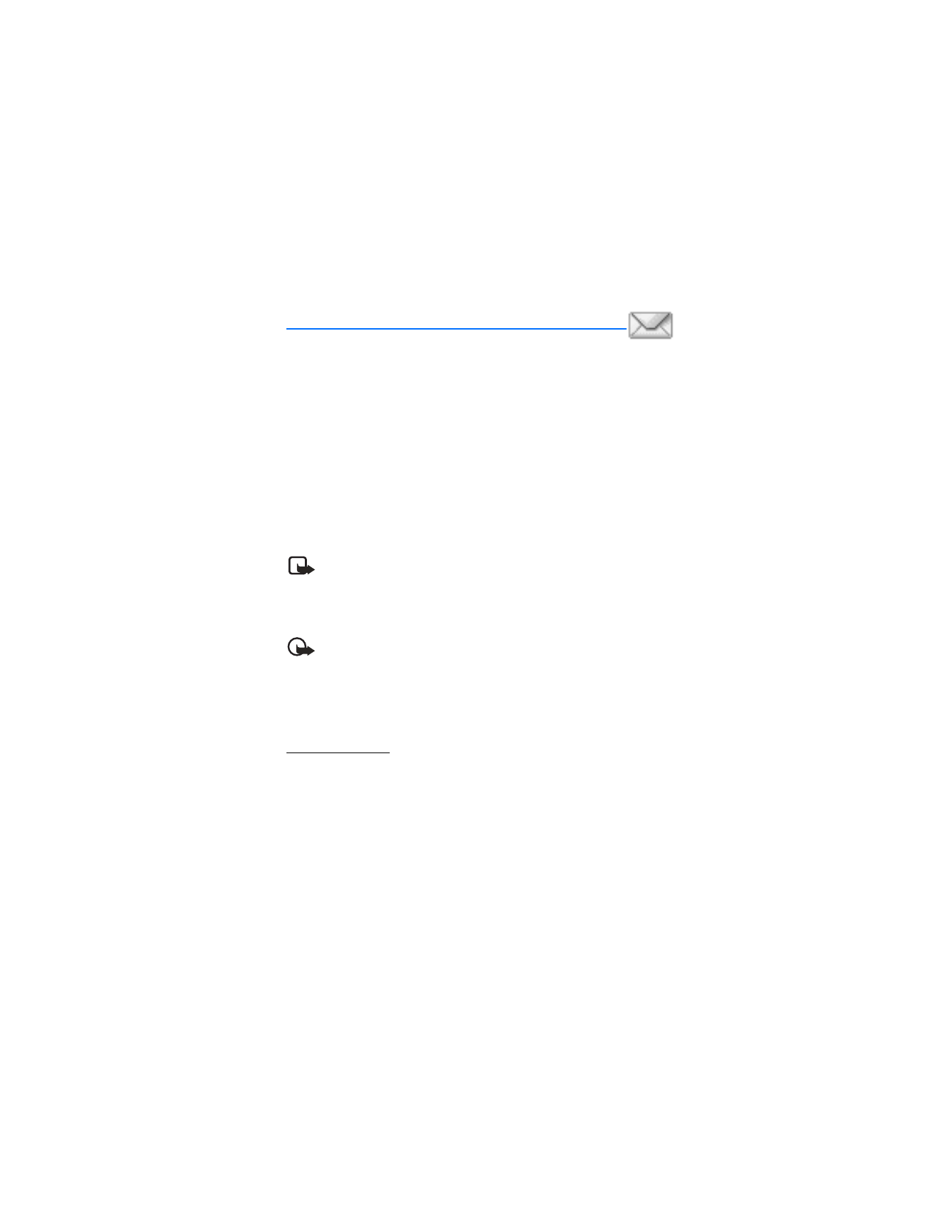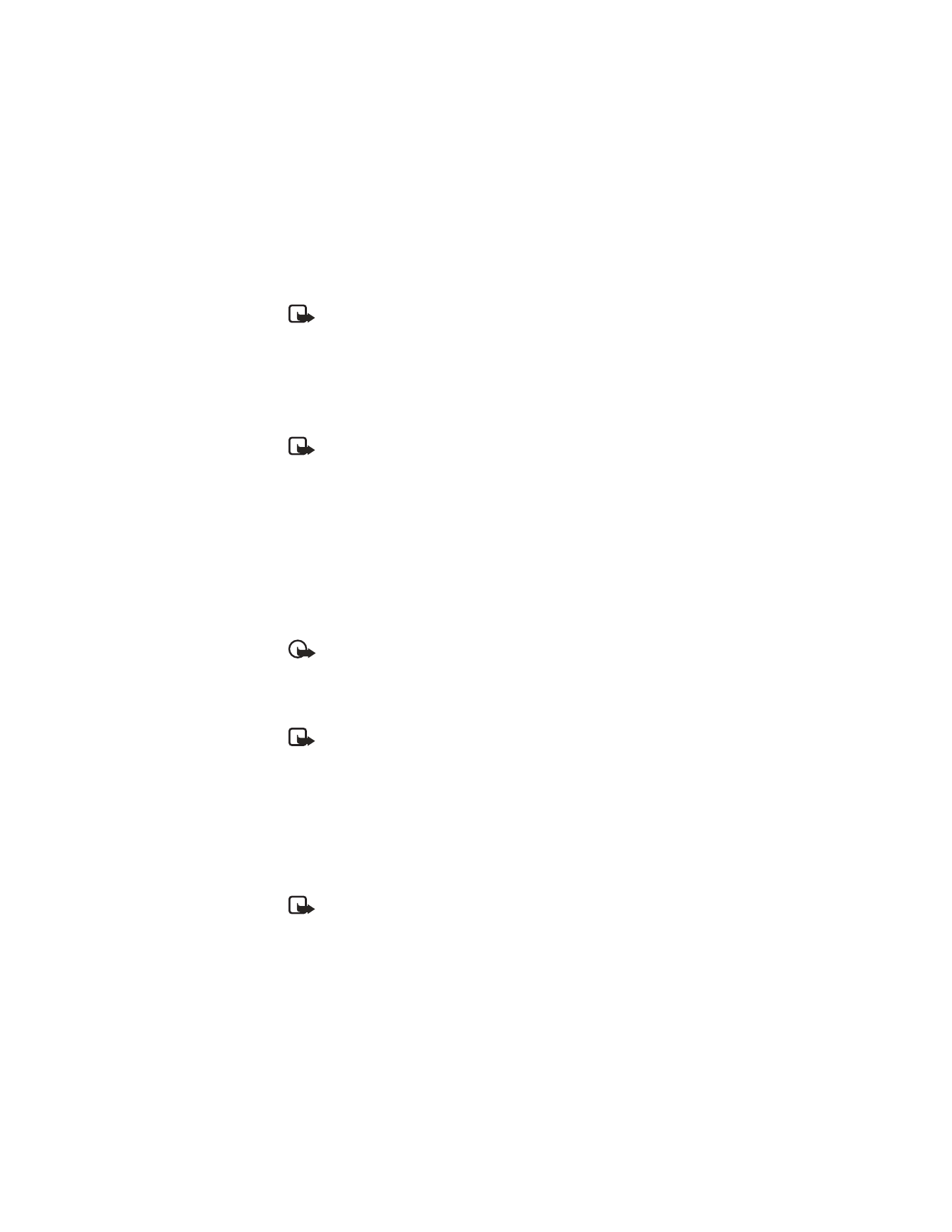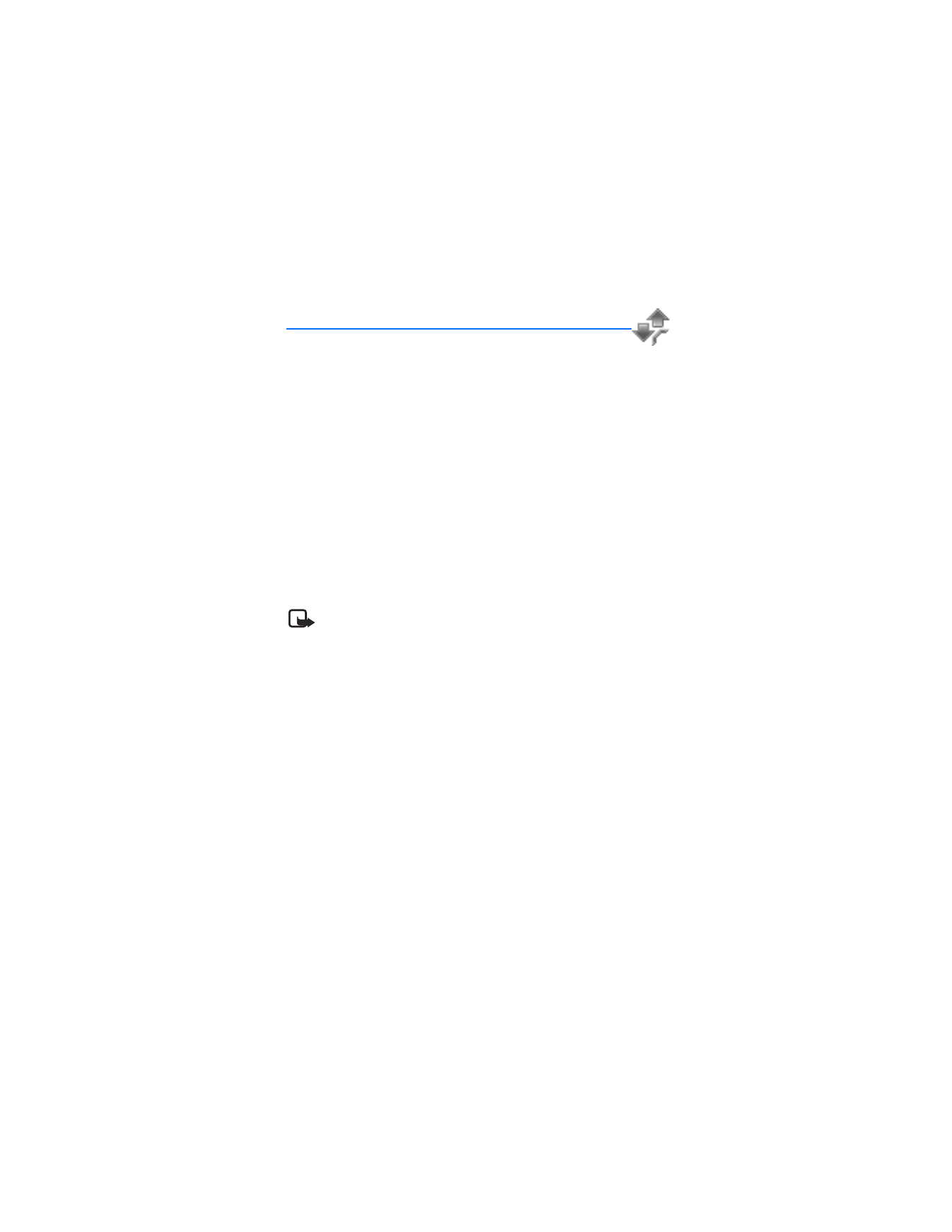
4. Messages (Menu 1)
If you have subscribed to a message network service, you can send and receive
messages to compatible phones that are also subscribed to a message service.
You can also send and receive picture messages, multimedia messages, and
e-mail if supported by your service provider. Also, you can make distribution lists
that contain phone numbers and names from your contact list. See "Distribution
lists," p. 34 for more information.
When composing TXT Messages, picture messages, or multimedia messages,
check the number of characters allowed in the top right corner of the message.
Using special (Unicode) characters takes up more space. If there are special
characters in your message, the indicator may not show the message length
correctly. Before the message is sent, the phone will tell you if the message
exceeds the maximum length allowed for one message.
Note: When sending messages, your device may display
Message sent
.
This is an indication that the message has been sent by your device to the
message center number programmed into your device. This is not an
indication that the message has been received at the intended destination.
For more details about messaging services, check with your service provider.
Important: E-mail messages or multimedia message objects may
contain viruses or otherwise be harmful to your device or PC. Do not open
any attachment if you are not sure of the trustworthiness of the sender.
■ TXT Messages
Write and send
1. In the standby mode, select
Menu
>
Messages
>
Text messages
>
Create message
.
2. Compose or reply to a message using the keypad, and select
Send
.
For other options while composing the message, select
Options
and one of
the following:
Sending options
—Mark/Unmark options Urgent, Delivery note, and Signature.
Clear text
—Erase the text from the message editor.
Add-ins
—Add sound, animation, or pictures to a TXT Message.

26
Copyright © 2005 Nokia
Styles
—Select the style of font type, font size, and text alignment in a
TXT Message.
Insert contact
—Insert a name from your contacts list into your message.
Insert number
—Insert a phone number or find a phone number in the
contacts list.
Save message
—Select
Drafts
to save the message in the
Drafts
folder; select
Templates
to save the message as one of your predefined templates in the
Templates
folder.
Exit editor
—Exits the message editor.
Use template
—Insert a predefined template into your message.
Insert word
—Enter a word and insert it into your message. This option is
available if predictive text is on.
Insert symbol
—Insert a special character into your message. This option is
available if predictive text is on.
Predictive text
—Turn predictive text on or off.
3. To send the message, select
Send
to
>
Send to number
,
Send to e-mail
,
Send
to many
, or
Send to distrib. list.
Enter the recipient’s phone number or e-mail
address or select
Search
to retrieve a number or e-mail address from
Contacts
,
and select
Send
.
Templates
Templates are short, prewritten messages that can be recalled and inserted into
new TXT Messages when you are short on time.
1. In the standby mode, select
Menu
>
Messages
>
Text messages
>
Create message
.
2. Select
Options
>
Use template
.
3. Scroll to one of the available templates, and press
Select
.
4. Select
Send
to
>
Send to number
,
Send to e-mail
,
Send to many
, or
Send to
distrib. list
(only when a distribution list has been created) and press
Select
.
5. Enter the recipient’s phone number or e-mail address, or select
Search
to
retrieve a number or e-mail address from your contacts list, and select
Send
.
A distribution list only contains phone numbers of recipients, and is selected
from a list of predefined groups you created.

27
Copyright © 2005 Nokia
Messages (Menu 1)
Read and reply
When you receive a message, a notification message and the unopened letter
icon (
) appear in the display.
1. Press
Show
to read the message, or
Exit
to dismiss the notification and read
the message later.
When you have unopened messages in your inbox,
is shown in the upper
left corner of the screen in the standby mode as a reminder.
Use the Scroll down key to view the whole message if necessary.
2. Select
Reply
>
Empty screen, Original text, Template,
or one of the predefined
answers, then compose your reply using the keypad.
3. Press
Send
.
Options
When you read a TXT Message, some or all of the following options are available:
Delete
—Discard the message.
Message details
—View the time, date, and phone number of the sender.
Use number
—Choose
Add to contact
,
Send message
, or
Call
.
Save
—Save the message to
Sent items
,
Archive
,
Templates
, or a folder you
have created.
Forward
—Forward the message to another phone number or e-mail address.
Rename
—Edit the title of the message.
Save address
—Save an e-mail address in a TXT Message.
Use web link
—Display web links in a TXT Message and connects to the link with
the browser.
Change sending options
1. In the standby mode, select
Menu
>
Messages
>
Text messages
>
Message
settings
>
Sending options
to change sending options for all TXT Messages.
2. To change sending options for one message, in the standby mode, select
Menu
>
Messages
>
Text messages
>
Create message
>
Options
>
Sending options
.
3. Select the setting you wish to change:
Priority
—Set the priority of the note as
Normal
or
Urgent
.

28
Copyright © 2005 Nokia
Delivery note
—A note is sent to you confirming delivery of the message.
Select
On
or
Off
.
Send callback number
—A callback number is sent to the recipient. Select
Off
or your phone number.
Signature:
—Write a Signature to send with TXT Messages, or select
Off
.
Change message settings
1. In the standby mode, select
Menu
>
Messages
>
Text messages
>
Message
settings
>
Other settings
.
2. Select the setting you wish to change:
Message overwriting
—Select
Sent items only
,
Inbox only
,
S. items & Inbox
,
or
Off
.
Note: When the message memory is full, your phone cannot send or
receive any new messages. However, you can set your phone to
automatically replace old messages in the
Inbox
and
Outbox
folders
when new ones arrive.
Save sent messages
—Select
Always save
,
Always prompt
, or
Off
.
Auto-playback of sounds
—Select
On
or
Off
to have a sound in a message
automatically played when highlighted.
Queue msgs.when digital unavailable
—Select
On
,
On prompt
, or
Off
.
Messages are stored in the Outbox until they can be sent with digital service.
■ Enhanced messages
Enhanced messaging is a network service. If your wireless service provider supports
this feature, enhanced messaging functions in the same manner as text messaging,
but it offers additional options for the style and content of the message.
Enhanced messages behave the same as TXT Messages, but attachments take up
more space than text. For more details about services and pricing, check with
your service provider.
In the standby mode, select
Menu
>
Messages
>
Text messages
>
Create message
>
Options
>
Add-ins
or
Styles
.
When creating an enhanced message, the following options are available:
Add-ins
—Select
Sound
,
Animation
, or
Picture
to add to the message.
Styles
—Select the
Font type
,
Font size
, or
Text alignment
of the message.

29
Copyright © 2005 Nokia
Messages (Menu 1)
Note: If you try to send an enhanced message to a phone that does not
support enhanced messaging, the enhanced messaging content will be
stripped from the message, leaving only the text you have entered.
While viewing a received enhanced message, the following options are available:
Sound
—Select
Play sound
or
Save sound
.
Animation
—Select
Save animation
.
Picture
—Select
Save picture
.
Note: Enhanced messaging is a network service. For availability and
subscription, contact your service provider. Only compatible devices
subscribing to the service can receive and display enhanced messages.
■ Pix Place multimedia messages
A multimedia message can contain text, sound, and a picture, or a multimedia
message can contain a video clip. Your phone supports multimedia messages that
are up to 300 KB. If the maximum size is exceeded, the phone may not be able to
receive the message. Pictures are scaled to fit the display area of the phone. Your
phone has a multimedia message viewer for playing messages and a multimedia
folder for storing saved messages. Once you save the multimedia message, you
can use the image as a screen saver or the sound as a ringing tone.
Important: Multimedia message objects may contain viruses or
otherwise be harmful to your device or PC. Do not open any attachment
if you are not sure of the trustworthiness of the sender.
Copyright protections may prevent some images, ring tones, and other content
from being copied, modified, transferred, or forwarded.
Note: Multimedia messaging can be used only if it is supported by your
service provider or network operator. For availability and a subscription
to the multimedia messaging service, contact your service provider or
network operator. Only compatible devices can receive and display
multimedia messages.
Multimedia messaging supports the following formats:
•
Picture: JPEG, GIF, animated GIF, WBMP, BMP, and PNG
•
Sound: SP-MIDI, AMR audio, QCELP, and monophonic ring tones
•
Video: clips in H.263 format with SubQCIF image size and AMR audio
Note: If a received message contains unsupported elements, these
elements may be replaced with the text Object format not supported.

30
Copyright © 2005 Nokia
You cannot retrieve multimedia messages if you have a call in progress, games or
other applications running, or an active browsing session. Because delivery of
multimedia messages can fail for a variety of reasons, do not rely solely upon
them for essential communications.
Multimedia message settings
Before you can use the multimedia message feature, you must specify whether
you want to receive multimedia messages at all times or only if you are in the
service provider’s home system. This is a network service. Check with your service
provider for more information.
The default setting of the multimedia message service is generally on. The appearance
of a multimedia message may vary depending on the receiving device.
Allow or block multimedia reception
You can choose to receive all messages, to block all messages, or to receive
messages only when you are in the service provider’s home network.
1. In the standby mode, select
Menu
>
Messages
>
Multimedia msgs.
>
Message
settings
>
Allow multimedia reception
and one of the following:
Yes
—Allow all incoming messages.
In home network
—Allow incoming messages only if you are in the service
provider’s home system. This is a network service. Check with your service
provider for more information.
No
—Block all incoming messages.
2. Select
Incoming multi-media messages
>
Retrieve
to automatically retrieve
all messages to your inbox. When new messages arrive, you are notified
Multimedia message received
, or
Multimedia messages received
.
Select
Retrieve manually
to choose which messages you want to retrieve to
your inbox. When messages are available, you are notified
1 multimedia
message available
, or if more messages are available, the notification shows
how many.
Select
Reject
to automatically reject all multimedia messages received.
3. If you choose to automatically retrieve messages, you can select
Show
to read
the multimedia message, or
Exit
to view them in your inbox later.
If you select to manually retrieve messages, select
Show
to open the message
notification, and then select
Retrieve
. Or select
Exit
to save the notification to
your inbox, and retrieve the message later.

31
Copyright © 2005 Nokia
Messages (Menu 1)
4. When you receive an incoming multimedia message, you can also choose
Exit
if you do not want to retrieve the message.
Allow or block advertisements
This setting is not available if multimedia reception is blocked.
In the standby mode, select
Menu
>
Messages
>
Multimedia msgs.
>
Message
settings
>
Allow adverts
>
Yes
or
No
.
This is a network service. Check with your service provider for more information.
Other MMS settings
Other MMS settings include saving your messages to the
Sent items
folder and
editing your connection settings.
In the standby mode, select
Menu
>
Messages
>
Multimedia msgs.
>
Message
settings
and one of the following:
Save sent messages
—Select
Yes
to save sent multimedia messages to the
Sent
items
folder or
No
to discard.
Delivery reports
—Select
Yes
to be informed if the message was delivered or
No
to
not be informed.
Default slide timing
—Set the default time in mm:ss format for each slide in an
MMS to remain on the screen.
Folders
Your phone has the following folders under
Messages
>
Multimedia msgs.
:
Inbox
—Contains received multimedia messages.
Outbox
—Contains multimedia messages which you have sent and are still
waiting to be transmitted.
Sent items
—Contains sent multimedia messages.
Saved items
—Contains saved multimedia messages that you can send later.
Delete messages
—Delete messages in the
Inbox
, Outbox,
Sent items
, or
Saved items
.
Message settings
—Select settings for
Save sent messages
,
Delivery reports
,
Default slide timing
,
Allow multimedia reception
,
Incoming multi- media
messages
, and
Allow adverts
.
Write and send multimedia messages
1. In the standby mode, select
Menu
>
Messages
>
Multimedia msgs.
>
Create message
.

32
Copyright © 2005 Nokia
2. Enter the text of your message, and select
Options
>
Insert
>
Image
,
Sound
clip
,
New sound clip
,
Video clip
,
Slide
,
Business card
or
Calendar note
.
The list of available folders in the
Gallery
is shown.
3. Open the desired folder, scroll to the image, sound clip, or video clip, and
select
Options
>
Insert
.
Copyright protections may prevent some images, ring tones, and other
content from being copied, modified, transferred, or forwarded.
4. To add a new page (also called a slide) to the message, select
Options
>
Insert
>
Slide
.
Each slide can contain text, one image, a business card, calendar note, and
one sound clip. If the message contains several slides, you can open the
desired slide by selecting
Previous slide
,
Next slide
, or
Slide list
.
5. To set the time interval between the slides, select
Options
>
Slide timing
, enter
the time interval, and select
OK
.
6. To move the text to the top or bottom of the message, select
Options
>
Place text first or Place text last
.
7. To insert a name from contacts, select
Options
>
More options
>
Insert contact
,
scroll to the desired name, and select
Select
.
8. To insert a number, select
Options
>
More options
>
Insert number
, enter the
number or search for it in contacts, and select
OK
.
9. To insert a calendar note, select
Options
>
Insert
>
Calendar note
.
10. To insert a business card, select
Options
>
Insert
>
Business card
.
11. To delete an image, slide, video clip, or sound clip from the message, select
Options
>
Delete
>
Image
,
Sound clip
,
Video clip
, or
Slide
.
12. To add a subject to the message, select
Options
>
More options
>
Edit subject
,
enter a subject, and select
OK
.
13. To view the message or slide presentation before sending it, select
Options
>
Preview
.
14. To save the message to the
Saved items
folder, select
Options
>
Save message
.
15. To send the message, select
Send
, or select
Options
>
Send to e-mail
,
To Pix
Place
,
Send to many
, or
Send to distrib. list
.
To Pix Place
is an online network service. Check with your service provider for
more information.

33
Copyright © 2005 Nokia
Messages (Menu 1)
16. Enter the recipient’s number or search for it in contacts; select
Options
to
enter the e-mail address; and select
OK
.
The message is moved to the
Outbox
folder for sending.
It takes more time to send a multimedia message than to send a TXT Message.
While the multimedia message is being sent, the animated indicator
is displayed
and you can use other functions on the phone. If there is an interruption while
the message is being sent, the phone automatically tries to resend it a few times.
If this fails, the message remains in the Outbox folder and you can try to manually
resend it later. Check your
Outbox
folder for unsent messages.
Note: When sending messages, your device may display the words
Multimedia message sent
. This is an indication that the message has
been sent by your device to the message center number programmed
into your device. This is not an indication that the message has been
received at the intended destination. For more details about messaging
services, check with your service provider.
Messages that you have sent are saved in the
Sent items
folder if the setting
Save sent messages
is set to
Yes
. See "Other MMS settings," p. 31. This is not
an indication that the message has been received at the intended destination.
Read and reply to multimedia messages
When a multimedia message is being received,
appears animated in the
display along with the percentage display indicating the sending progress.
Once the message has been fully downloaded,
and
1 multimedia message
available
or
Multimedia messages available
appears in the display.
1. To retrieve and view the message immediately, select
Show
.
To save the message to the inbox for later viewing, select
Exit
.
2. To view a saved message, select
Messages
>
Multimedia msgs.
>
Saved items
and scroll to view the message.
3. While viewing the message, select
Play
to view the entire MMS, or select
Options
and one of the following:
View text
—View only the text included in the message.
Open image
,
Open sound clip
, or
Open video clip
—View or listen to the
corresponding file.
Delete message
—Delete the message you are viewing.

34
Copyright © 2005 Nokia
Reply
or
Reply to all
—Enter a reply and send it to the original sender and any
other recipients of the message.
Forward to no.
,
Forward to e-mail
, or
Forward to many
—Forward the message
to a phone number, to an e-mail address, or to multiple recipients.
Message details
—View the sender’s name and phone number, the message
center used, reception date and time, message size and type.
Save image
,
Save sound clip
, or
Save video clip
—Save the corresponding file to
the gallery. Images, sound clips, and video clips must be opened before you
can save them.
If
blinks and
Multimedia memory full, view waiting msg.
appears in the
display, memory for multimedia messages is full. To view the waiting message,
select
Show
. Before you can save the message, you need to delete some of your
old messages. See "Delete messages," p. 38 for more information.
■ Distribution lists
You can send a TXT Message or multimedia message to multiple recipients at one
time. First, you must create a distribution list using the entries in your contacts list.
1. In the standby mode, select
Menu
>
Messages
>
Distribution lists
>
New
list
.
2. Enter the name of the list and press
OK
.
3. With the list highlighted, select
Add
.
4. Scroll to the contact you want to add to the distribution list and press
Select
.
5. Highlight the phone number you want to add and press
Select
.
Repeat steps 3–5 to add additional contacts to the distribution list.
6. To create additional distribution lists, in the standby mode, select
Menu
>
Messages
>
Distribution lists
>
Options
>
Create new list
.
■ Voice messages
If you subscribe to voice mail, your wireless provider will furnish you with a voice
mailbox number. You need to save this number to your phone to use voice mail.
When you receive a voice message, your phone lets you know by beeping, displaying
a message, or both. If you receive more than one message, your phone shows the
number of messages received.

35
Copyright © 2005 Nokia
Messages (Menu 1)
Save voice mailbox number
Your wireless provider may have already saved your voice mailbox number to
your phone. If so, the number will appear in the display in step 1. Press
OK
to
leave the number unchanged.
1. In the standby mode, select
Menu
>
Messages
>
Voice messages
>
Voice
mailbox number
.
The
Voice mailbox number
screen appears in the display.
2. If the box is empty, enter the voice mailbox area code and number, or
enter *86.
3. Press
OK
.
Call and setup your voice mail
1. Once you have saved the voice mailbox number, press and hold the 1 key.
2. When you connect to voice mail and the prerecorded greeting begins, follow
the service’s automated instructions to setup your voice mail.
Listen to your voice messages
Once you have setup voice mail, you can dial the voice mailbox number in one
of five ways:
•
Dial the number using the keypad.
•
Press and hold the 1 key.
•
Press the 1 key and the Send key.
•
Press
Listen
if there is a notification message in the display.
•
In the standby mode, select
Menu
>
Messages
>
Voice messages
>
Listen to
voice messages
.
Once you connect and the prerecorded greeting begins, follow the automated
instructions to listen to your voice messages.
Automate voice mail
You can insert special characters called dialing codes into phone numbers such
as voice mail, and save the number to a 1-touch dialing location. Dialing codes
instruct the receiving system to pause, wait, bypass, or accept the numbers that
follow them in the dialing string.

36
Copyright © 2005 Nokia
Note: Voice mail services vary by service provider. The following
instructions are examples of common operations. Please check with your
service provider for specific instructions for using your voice mail service.
Write down voice mailbox number and process
1. Write down your voice mailbox number.
2. Call and check your voice mail as you normally would.
3. Write down your interaction with the recorded prompts step-by-step. Keep in
mind that each voice mail service may vary. However, it should look something
like this:
Dial 8585551212, pause 5 seconds, press 1, pause 2 seconds, press 1234,
press pound key.
Be precise; you will need this information in "Setup voice mail with 1-touch
dialing codes," p. 36.
Insert dialing codes
Press the * key repeatedly to cycle through dialing codes. Once the desired
code appears in the display, pause briefly and the code is inserted into the
dialing string.
The following dialing codes are available:
*—Bypasses a set of instructions.
p—Pauses for 2.5 seconds before sending any numbers that follow.
w—Waits for you to press the Send key before sending the numbers or codes
that follow.
Setup voice mail with 1-touch dialing codes
1. In the standby mode, select
Names
>
1-touch dialing
.
2. Scroll to an empty 1-touch dialing slot (2-9) and press
Assign
.
3. Enter your voice mailbox number, including the area code.
4. Refer to dialing codes and enter any codes as necessary using the information
that you wrote down from, "Call and setup your voice mail," p. 35.
For example, if you pause for 5 seconds after connecting to voice mail, enter p
twice after the voice mailbox number, for example, 2145551212pp.
5. Enter any remaining pauses or other information that allows you to listen to
your messages, and press
OK
.
6. Enter a name (such as Voice Mail), and press
OK
.
To dial and listen to your voice mail, press and hold the assigned 1-touch dialing
key in the standby mode.

37
Copyright © 2005 Nokia
Messages (Menu 1)
■ Message folders
Save drafts and received messages to folders
You can save drafts of messages or received messages to an existing folder or to a
folder that you have created.
1. Open the received message or create a new message, and press
Options
.
2. To save a received message, select
Save message
>
Sent items
,
Archive
,
Templates
, or a folder you have created on your own.
3. To save a draft of a message you are creating, select
Save message
>
Drafts
or
Templates.
View messages
1. In the standby mode, select
Menu
>
Messages
>
Text messages
.
2. Select the folder containing the message you wish to view:
Inbox
—Messages are automatically stored in this folder after they have been
read or if you press
Back
when the message notification appears in the
standby mode.
Outbox
—Messages that have not been sent are stored in this folder.
Sent items
—Messages that have been sent are automatically stored in
this folder.
Drafts
—Messages created, but not sent are automatically stored in this folder.
Archive
—Store messages that have been read and that you want to keep in
this folder.
Templates
—Pictures and prewritten templates are stored in this folder.
Preloaded templates can be edited and customized.
My folders
—Keep your messages organized by creating custom folders and
saving some of your messages here. Select
Options
>
Add folder
to add a
custom folder. You can also select
Options
>
Rename folder
or
Options
>
Delete folder
to rename or delete a folder you have created.
3. Once the folder opens, scroll to the message you wish to view, and press
Select
.

38
Copyright © 2005 Nokia
■ Delete messages
If your message memory is full and you have more messages waiting at the
network,
No space for new messages
appears on the display in the standby mode.
You can do the following:
•
Read some of the unread messages, and delete them individually.
•
Delete messages from some of your folders.
A single message
To delete a single message, you need to open it first.
1. In the standby mode, select
Menu
>
Messages
>
Text messages
.
2. Scroll to the folder containing the message you wish to delete, and press
Select
.
3. Scroll to the message you wish to delete, and press
Select
.
4. Select
Options
>
Delete
.
5. Press
Yes
to delete the message or
Back
to exit.
All messages in a folder
1. In the standby mode, select
Menu
>
Messages
>
Text messages
>
Delete messages
.
2. Scroll to the status of the messages you wish to delete, and press
Select
:
All
—Deletes all messages in all of the folders.
All read
—Deletes any messages which have been read in all of the folders.
All unread
—Deletes any messages which have not been read in all of the folders.
Mark
the folders that have messages you want to delete:
Inbox
—Deletes all messages from the
Inbox
folder.
Sent items
—Deletes all messages from the
Sent items
folder.
Outbox
—Deletes all messages from the
Outbox
folder.
Drafts
—Deletes all messages from the
Drafts
folder.
Archive
—Deletes all messages from the
Archive
folder.
User-added folder—Deletes all messages from a folder you created and named.
3. Press
Done
>
Yes
to empty the marked folder.
Note: Only folders created in
My folders
can be deleted. The
Inbox
,
Sent items
,
Archive
, and
Templates
folders are protected. When you
delete a folder, all messages in the folder are also deleted.

39
Copyright © 2005 Nokia
Messages (Menu 1)
■ Voice tags
You can dial up to 25 stored numbers using voice dialing.
Before using voice tags, note that:
•
Voice tags are not language dependent. They are dependent on the
speaker’s voice.
•
You must say the name exactly as you said it when you recorded it.
•
Voice tags are sensitive to background noise. Record voice tags and use them
in a quiet environment.
•
Very short names are not accepted. Use long names and avoid similar names
for different numbers.
Note: Using voice tags may be difficult in a noisy environment or
during an emergency, so you should not rely solely upon voice dialing
in all circumstances.
Assign a voice tag to an entry
Before you can use voice dialing, you must first assign a voice tag to the number.
1. In the standby mode, select
Names
and use the Scroll up key or Scroll down
key to find the contact you want.
2. Highlight the contact you want to assign a voice tag, press
Details
>
Options
>
Add voice tag
>
Start
.
3. Speak clearly into the microphone.
Note: Do not press
Quit
unless you want to cancel the recording.
The phone automatically stops recording and saves and replays the voice tag.
The
icon appears next to commands which have voice tags assigned.
If recording is not successful, your phone displays
Voice system error
.
Press
Options
>
Add voice tag
, and repeat Step 3.
Dial a number
1. Press and hold
Names
.
2. When you hear several beeps and
Please speak now
appears, release the key.

40
Copyright © 2005 Nokia
3. Pronounce the voice tag clearly into the microphone.
When the phone finds the voice tag,
Found:
appears, and the phone automatically
dials the number. If the phone does not locate a number or recognize the
voice tag,
No match found
appears.
Voice tags
After you have associated a voice tag to a contact, you can choose one of the
following options:
Play back
1. Select
Menu
>
Contacts
>
Voice tags
.
2. Press
Select
, then scroll to the name with the voice tag you want to hear.
3. Press
Select
>
Playback
.
Change
1. Select
Menu
>
Contacts
>
Voice tags
.
2. Press
Select
, then scroll to the name with the voice tag you want to change.
3. Press
Select
>
Change
.
4. Press
Start
. The phone repeats your voice tag, and
Voice tag saved
appears.
Delete
1. Select
Menu
>
Contacts
>
Voice tags
.
2. Press
Select
, then scroll to the name with the voice tag you want to erase.
3. Press
Select
>
Delete
>
OK
.
■ Minibrowser messages
Mobile web messaging is a network service. See "Network Services," p. 6 for
more information.
If your wireless service provider supports this feature, you can use the Mobile
web to check for e-mail messages. In the standby mode, select
Menu
>
Messages
>
Minibrowser messages
>
Connect
.
See "Mobile Web (Menu 9)," p. 89 for more information on using the Mobile web
in your phone to access Web pages.

41
Copyright © 2005 Nokia
Call log (Menu 2)